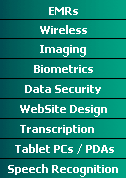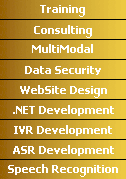



 |
| |
| Coding |
| Biometrics |
| Web Design |
| IVR Systems |
| EMR Systems |
| Transcription |
| Document Imaging |
| Data Security-Web |
| Speech Recognition |
| Legal |
| Manufacturing |
| Real Estate |
| Insurance |
| Distribution |
| Sales Agencies |
| SuperSpeed |
| SuperCache |
| RamDisk+ |
 |
|||||||
| Tablet
PCs Reshape Computing Landscape
|
|||||||
|
Using TAP 'N TALK® technology, users will interact with a Tablet PC platform through speech, ink, and touchscreen recognition. Operating a specialized version of the Microsoft Windows XP operating system, Tablet PCs allow the user to quickly and easily change the screen orientation. Users can switch from portrait to landscape modes as often as needed to meet the changing work environment and scenario requirements. As an example, although a Microsoft Word document lends itself to portrait mode, a Microsoft PowerPoint presentation, an Excel spreadsheet, or a Medical X-Ray, may be better viewed in landscape mode. Handwritten documents can be created using electronic ink for subsequent conversion into text or reference retrieval. Sporting USB, serial, FireWire, external VGA, keyboard, and PS/2, ports, these powerhouse PCs weighing in at 3 pounds, pack the power and punch needed to run today's most resource hungry Windows applications. Slim and lightweight, Tablet PCs will easily dock at the desktop to gain full access to a large screen monitor, a full-size keyboard, and a mouse. Ideally, Tablet PCs will be used by professionals who spend much of their time away from their desk. In a health-care environment for example, doctors and nurses will be able to move between examination rooms taking full advantage of software such as Opt!® Professional PRMS. Processing speech and stylus data input, Tablet PCs will efficiently and effortlessly create a comprehensive charting and patient encounter report.
Tablet PCs could also be used in waiting rooms, allowing patients to fill out medical history forms electronically. Additionally, bilingual patient education is another potential use for tablet PCs, where doctors can use anatomy applications to show patients the origin of their complaints and help them understand their problems and the suggested treatments. Sporting thin ergonomic designs, Tablet PCs with long battery life, copious amounts of RAM memory, large hard drives, and screen resolutions that rival the LCD platform today, add user functionality to run even the most resource hungry Windows applications. Voxcera and Accudata Systems have been at the forefront of this computing revolution, implementing TAP 'N TALK® functionality through the use of speech recognition and touchscreen technology. Hardware manufacturers and software publishers who have demonstrated their intense passion for this computing experience will be supported. For additional information on hardware platforms and software applications that are available for all professional organizations call: |
|||||||
Website
Design by Accudata Systems |
|||||||
| TAP
'N TALK®
is
a registered trademark of Voxcera |
|||||||
| Copyright © by Voxcera 2003, All Rights Reserved | |||||||